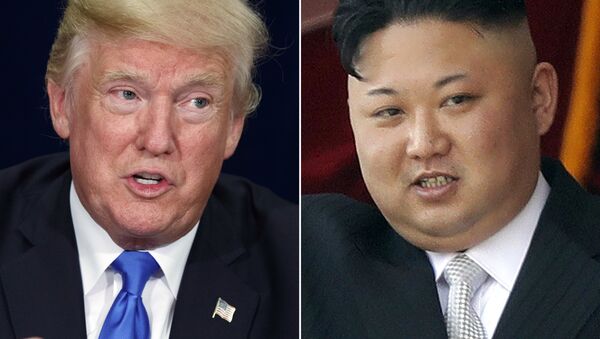On Wednesday, Trump said in an interview with Reuters that Russia was "not helping us at all with North Korea," accusing Moscow of "denting" what had been achieved by China through introducing harsh economic sanctions against Pyongyang. According to the US president, Russia is allegedly helping North Korea by supplying the country with fuel in violation of international sanctions.
Trump also indicated that the United States was increasing its missile defense and offense capabilities, noting that whereas he hoped that the tensions between Washington and Pyongyang could be resolved in a peaceful manner, "it’s very possible that it can’t."
READ MORE: New US Defense Strategy: Work With Diplomats or Deal With Military
Shifting Blame for Stalemate
As the international sanctions — strictest in modern history – do not seem to bear promised results in the deed of the Korean Peninsula’s denuclearization, Washington seeks to redirect the global frustration to Russia, Dr. Donald Baker with Department of Asian Studies at the University of British Columbia told Sputnik.
"Trump never wants to admit he has failed in something he promised to do. He always blames someone else. That is exactly what he is doing with his attempt to shift blame to Russia for the failure of the sanctions to stop North Korea’s military build-up," Baker said.
Doctor M. V. Ramana, the Simons Chair in Disarmament, Global and Human Security at the Liu Institute for Global Issues at the University of British Columbia expressed the same position, noting that Trump sought to shift blame from the sanctions regime as a whole to alleged flaws of certain nations.
READ MORE: Unified Korean Women's Ice Hockey Team 'Reflects Olympic Ideals' — IIHF
"This might be an attempt to shift the blame to other countries. In general, the United States government does not seem to want to admit that sanctions alone definitely do not work, and so would like to attribute North Korea’s continued nuclear developments to weaknesses in the sanctions regime," Ramana told Sputnik.
As the international community is facing a frustrating stalemate in the joint efforts to stop North Korea’s nuclear and missile development, Trump has yet to realize that sanctions do not always bring expected results, Dr. Srinivasan Sitaraman, an associate professor at Department of Political Science at Clark University in Worcester, Massachusetts, told Sputnik.
"The hope is that [North Korea's leader] Kim [Jong Un's regime] will crack under the weight of the sanctions placed by the UN Security Council has not come to fruition. North Korea continues to find ways to evade these sanctions and the regime continues to thrive, I am sure Mr. Trump is frustrated and he is finding that the politics of sanctions are lot more complex when you are in power," Sitaraman said.
Clipping Wings of Resumed Intra-Korean Talks
The US leader’s remarks regarding Washington’s plans to further enhance its missile offense capabilities are improbable to have any positive impact on the situation in the region, unlike resumed talks between the South and the North, according to Ramana.
"I think Trump’s statement, like many of his earlier statements, is definitely not helpful to resolve the tensions on the Korean Peninsula. In contrast, the recent attempts at dialogue and joint participation in the Olympics are clearly helpful," the expert said.
Furthermore, such statements are likely to ignite the situation in the region by forcing Pyongyang to continue on strengthening its own nuclear and missile potential, Baker warned.
READ MORE: Trust on Nuclear, Other Issues Between US, Russia Continues to Wane — UN Chief
"Trump’s statement is pouring fuel on the fire that is already burning in Northeast Asia. Talk of increasing the offensive missile capability of the US will only stimulate North Korea to further enhance is nuclear bomb and IBM capability," he said.
According to the expert, Washington is "uncomfortable" with Seoul’s attempts to resume dialogue with Pyongyang, and therefore the United States would neither seek active engagement nor be helpful in the mediation of the ongoing talks.
Trump’s announcement of strengthening missile defense and offense capability most certainly will result into the deployment of additional anti-missile systems across the region, including additional US Terminal High Altitude Area Defence (THAAD) missile defense systems in South Korea.
While South Korea seems to have little choice whether it would cede, it could still oppose such requests, especially given that Seoul reached breakthrough agreements with Pyongyang regarding marching under the "unification flag" and forming a joint female hockey team during the upcoming Winter Olympics, Sitaraman pointed out.
"I am confident in saying that despite Mr. Trump’s statement it is extremely unlikely that South Korea would be willing to jeopardize the delicate arrangements that they have made North Korea," the expert said.
The rapprochement between Seoul and Pyongyang began after North Korean leader Kim Jong Un's New Year address, in which he backed the idea of sending his country's athletes to the Winter Olympic Games in South’s Pyeongchang. The neighboring states are currently engaged in talks on issues related to Pyongyang’s participation in the Olympics.
READ MORE: S Korea Restores Military Hotline With N Korea — Reports
North and South Korea have been divided since the end of the World War II and the situation on the Korean Peninsula grew particularly tense in the last year, as North Korea continued its missile and nuclear tests, despite the opposition of its neighbors and their allies.
The views and opinions expressed by the experts do not necessarily reflect those of Sputnik.

